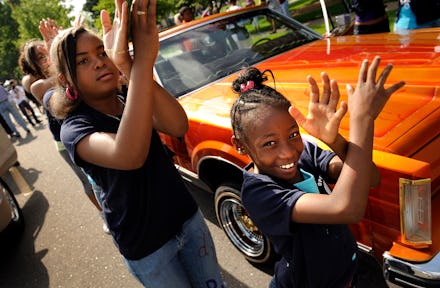The Most Important Holiday In America You Probably Aren't Celebrating

It's 1865. You're a slave in Texas. In the three years since President Abraham Lincoln declared all slaves emancipated, Cousin Jethro in Virginia and Aunt Sybil in North Carolina have both ditched plantation life for the slightly greener pastures of sharecropping and the open road.
But your life hasn't changed; things are still terrible. In fact, hordes of slave owners from Louisiana, Alabama and elsewhere have decided they aren't letting their slaves go without a fight, and dragged more than 150,000 of them to the Lone Star state and put them to work right next to you.
Life really ain't shit. Then, on June 19 — 150 years ago Friday, in fact — it happens: Maj. Gen. Gordon Granger of the Union Army issues General Orders No. 3, declaring all slaves freed in the state of Texas. What took so long, Texas? Did you not hear the president's orders? Theories vary on what was really going on there, but eventually, the slaves walked free and into a fresh new hell called "being black in America."
And thus was born Juneteenth — the most widely recognized commemoration of the end of American slavery. Everyone in the U.S. should celebrate Juneteenth.
Yet not enough do. In Texas since 1980, and in Oklahoma since 1994, it's a state holiday. In around 200 other cities, it's recognized as a local observance, according to the International Business Times. Its popularity has waxed and waned over the years: The website Juneteenth.com paints an optimistic picture of the holiday's future, citing a "[continued] increase" in the cities and states that recognize it, but also acknowledges that economic turmoil in the early 20th century caused a significant drop off in celebrations.
Today, some cultural institutions, museums and community organizations put together Juneteenth-related events. Traditions are established and repeated. Parades are had. Barbecue and "red carbonated seltzer water" is consumed in abundance. But all attempts to make it a national holiday have failed — one as recently as 2012, when former Sen. Kay Bailey Hutchison (R-Texas) sponsored a congressional resolution that would have required the president to publicly acknowledge Juneteenth every year.
That resolution was rejected. Meanwhile, everyone gets paid time off for Columbus Day and Presidents Day — one of which celebrates the kickoff of America's longest-running genocide, and the other a happy birthday to our very own founding slaveowner.
That we do not universally celebrate their antithesis — Juneteenth, the day America ceased to be a slave nation — is not something to be proud of. But just because Congress won't give it to us doesn't mean we can't take it for ourselves. Throw a barbecue. Support your local Juneteenth celebration. Read some Ellison.
But if nothing else, remember that America's still-unrealized promise of human equality took its first steps on June 19, 1865.